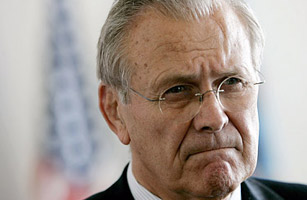
Just days after his resignation, Defense Secretary Donald Rumsfeld is about to face more repercussions for his involvement in the troubled wars in Iraq and Afghanistan. New legal documents, to be filed next week with Germany's top prosecutor, will seek a criminal investigation and prosecution of Rumsfeld, along with Attorney General Alberto Gonzales, former CIA director George Tenet and other senior U.S. civilian and military officers, for their alleged roles in abuses committed at Iraq's Abu Ghraib prison and at the U.S. detention facility at Guantanamo Bay, Cuba. The plaintiffs in the case include 11 Iraqis who were prisoners at Abu Ghraib, as well as Mohammad al-Qahtani, a Saudi held at Guantanamo, whom the U.S. has identified as the so-called "20th hijacker" and a would-be participant in the 9/11 hijackings. As TIME first reported in June 2005, Qahtani underwent a "special interrogation plan," personally approved by Rumsfeld, which the U.S. says produced valuable intelligence. But to obtain it, according to the log of his interrogation and government reports, Qahtani was subjected to forced nudity, sexual humiliation, religious humiliation, prolonged stress positions, sleep deprivation and other controversial interrogation techniques. Whatever the legal merits of the case, it is the latest example of efforts in Western Europe by critics of U.S. tactics in the war on terror to call those involved to account in court.